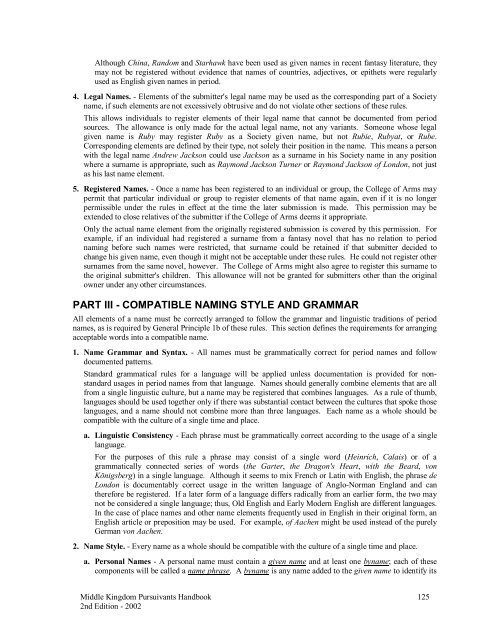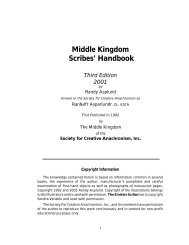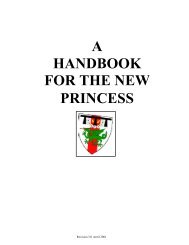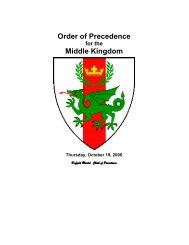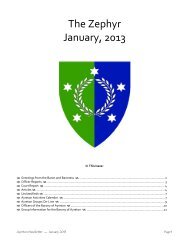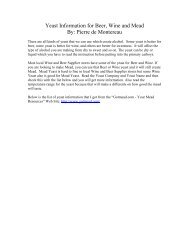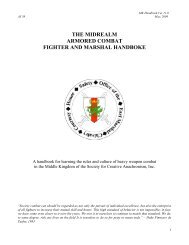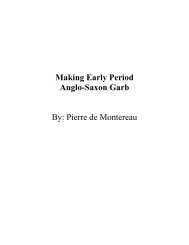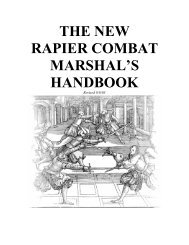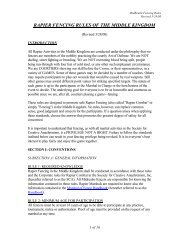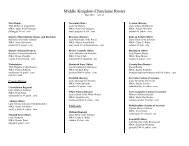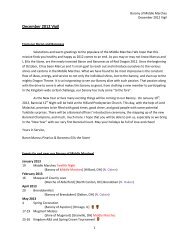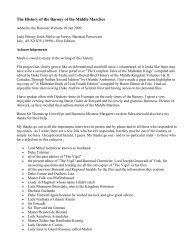. Presumptuous Claims - A name or piece of armory which expresses or implies presumptuous claims tostatus or powers that the submitter does not possess will not be registered.No name or armory will be registered that could be considered presumptuous and thereby cause offenseto a significant segment of the Society. See Part VI, Presumptuous Names, and Part XI, PresumptuousArmory.PART II - COMPATIBLE NAME CONTENTEvery word in a Society name must be compatible with period naming practices, as is required by GeneralPrinciple 1a of these rules. This section defines the categories of words that the College of Arms has generallyfound to be compatible.1. Documented Names. - Documented names, including given names, bynames, place names, and validvariants and diminutives formed in a period manner, may be used in the same manner in which they wereused in period sources.The name "Bucephalus", although it is documented as the name of Alexander the Great's horse, should notbe used as a name for a human. Pronunciation and spelling variants are linguistically valid if formedaccording to the rules for such variants in the language of the documented name. For example, thealternation of "C" and "K" at the beginning of names is a well-documented feature of Welsh. Therefore,both "Ceridwen" and "Keridwen" would be permitted, even if only one of these forms had been found inperiod sources. "Qeridwen" would not be permitted, since "Q" does not alternate with "C" and "K" inWelsh.2. Constructed Names. - Documented names and words may be used to form place names, patronymics,epithets, and other names in a period manner.Constructed forms must follow the rules for formation of the appropriate category of name element in thelanguage from which the documented components are drawn. For instance, the standard male patronymic inOld Norse consists of the possessive form of the father's name joined to the word son, like Sveinsson is theson of Svein. The documented Old Norse given name Bjartmarr could be used in this construction to formBjartmarsson, even if this particular patronymic was not found in period sources. Similarly, German townson rivers regularly use the name of the river with the word brück, like Innsbrück, to indicate the town had abridge over that river. A new branch could use the documented German name of the river Donau toconstruct the name Donaubrück.3. Invented Names. - New name elements, whether invented by the submitter or borrowed from a literarysource, may be used if they follow the rules for name formation from a linguistic tradition compatible withthe domain of the Society and the name elements used.Name elements may be created following patterns demonstrated to have been followed in period naming.Old English given names, for instance, are frequently composed of two syllables from a specific pool ofname elements. The given name Ælfmund could be created using syllables from the documented namesÆlfgar and Eadmund following the pattern established by similar names in Old English. Other kinds ofpatterns can also be found in period naming, such as patterns of meaning, description, or sound. Suchpatterns, if sufficiently defined, may also be used to invent new name elements. There is a pattern of usingkinds of animals in the English place names Oxford, Swinford and Hartford, and so a case could be made forinventing a similar name like Sheepford. No name will be disqualified based solely on its source.a. Invented name elements may not consist of randomly arranged sounds or characters.Use of components of name elements without reference to a period naming pattern, such as combiningthe syllables of Ælfgar and Eadmund to form Ælfmunead, will not be allowed. Similarly, patterns fromone language or tradition may not be applied to elements from a different language. The existence of thetwo syllable pattern in Old English cannot justify combining syllables from the Spanish names Pedro andJose to invent Pese. Elulol and Myzzlyk, which create nonsense syllables and link them withoutreference to any period pattern, are also not acceptable.b. Invented given names may not be identical to any other word unless a strong pattern of use of a class ofwords as given names in the same language is documented.124 <strong>Middle</strong> <strong>Kingdom</strong> <strong>Pursuivants</strong> <strong>Handbook</strong><strong>2nd</strong> <strong>Edition</strong> - 2002
Although China, Random and Starhawk have been used as given names in recent fantasy literature, theymay not be registered without evidence that names of countries, adjectives, or epithets were regularlyused as English given names in period.4. Legal Names. - Elements of the submitter's legal name may be used as the corresponding part of a Societyname, if such elements are not excessively obtrusive and do not violate other sections of these rules.This allows individuals to register elements of their legal name that cannot be documented from periodsources. The allowance is only made for the actual legal name, not any variants. Someone whose legalgiven name is Ruby may register Ruby as a Society given name, but not Rubie, Rubyat, or Rube.Corresponding elements are defined by their type, not solely their position in the name. This means a personwith the legal name Andrew Jackson could use Jackson as a surname in his Society name in any positionwhere a surname is appropriate, such as Raymond Jackson Turner or Raymond Jackson of London, not justas his last name element.5. Registered Names. - Once a name has been registered to an individual or group, the College of Arms maypermit that particular individual or group to register elements of that name again, even if it is no longerpermissible under the rules in effect at the time the later submission is made. This permission may beextended to close relatives of the submitter if the College of Arms deems it appropriate.Only the actual name element from the originally registered submission is covered by this permission. Forexample, if an individual had registered a surname from a fantasy novel that has no relation to periodnaming before such names were restricted, that surname could be retained if that submitter decided tochange his given name, even though it might not be acceptable under these rules. He could not register othersurnames from the same novel, however. The College of Arms might also agree to register this surname tothe original submitter's children. This allowance will not be granted for submitters other than the originalowner under any other circumstances.PART III - COMPATIBLE NAMING STYLE AND GRAMMARAll elements of a name must be correctly arranged to follow the grammar and linguistic traditions of periodnames, as is required by General Principle 1b of these rules. This section defines the requirements for arrangingacceptable words into a compatible name.1. Name Grammar and Syntax. - All names must be grammatically correct for period names and followdocumented patterns.Standard grammatical rules for a language will be applied unless documentation is provided for nonstandardusages in period names from that language. Names should generally combine elements that are allfrom a single linguistic culture, but a name may be registered that combines languages. As a rule of thumb,languages should be used together only if there was substantial contact between the cultures that spoke thoselanguages, and a name should not combine more than three languages. Each name as a whole should becompatible with the culture of a single time and place.a. Linguistic Consistency - Each phrase must be grammatically correct according to the usage of a singlelanguage.For the purposes of this rule a phrase may consist of a single word (Heinrich, Calais) or of agrammatically connected series of words (the Garter, the Dragon's Heart, with the Beard, vonKönigsberg) in a single language. Although it seems to mix French or Latin with English, the phrase deLondon is documentably correct usage in the written language of Anglo-Norman England and cantherefore be registered. If a later form of a language differs radically from an earlier form, the two maynot be considered a single language; thus, Old English and Early Modern English are different languages.In the case of place names and other name elements frequently used in English in their original form, anEnglish article or preposition may be used. For example, of Aachen might be used instead of the purelyGerman von Aachen.2. Name Style. - Every name as a whole should be compatible with the culture of a single time and place.a. Personal Names - A personal name must contain a given name and at least one byname; each of thesecomponents will be called a name phrase. A byname is any name added to the given name to identify its<strong>Middle</strong> <strong>Kingdom</strong> <strong>Pursuivants</strong> <strong>Handbook</strong> 125<strong>2nd</strong> <strong>Edition</strong> - 2002
- Page 2:
Middle Kingdom Pursuivants Handbook
- Page 5 and 6:
INTRODUCTION.......................
- Page 7 and 8:
Saracens: Early to Mid-Medieval Mus
- Page 9 and 10:
IntroductionOsric of FayrehopeWhat
- Page 11 and 12:
AcknowledgementsMistress Elena de V
- Page 13 and 14:
The Middle KingdomCollege of Herald
- Page 15 and 16:
Regional HeraldsConstellation Heral
- Page 17 and 18:
Pursuivant DutiesDuties of the Bran
- Page 19 and 20:
All submissions should be sent to t
- Page 21 and 22:
What to Report?First of all, your r
- Page 23 and 24:
esponsibility now. It wouldn’t hu
- Page 25 and 26:
simply too pervasive. Chilly weathe
- Page 27 and 28:
switched into the losers’ bracket
- Page 29 and 30:
prevent accusations of a rigged lis
- Page 31 and 32:
the green fabric), a larger spool o
- Page 33 and 34:
Precedence and CourtesyCourtly Beha
- Page 35 and 36:
Territorial Barons and Baronesses m
- Page 37 and 38:
c. Once all presentations appear to
- Page 39 and 40:
i. Oaths of Fealty and Acknowledgem
- Page 41 and 42:
herald is the voice of the Crown an
- Page 43 and 44:
Award of the Dragon's FlightOP Abbr
- Page 45 and 46:
Award of ArmsOP Abbreviation - AoAL
- Page 47 and 48:
Order of the Red CompanyOP Abbrevia
- Page 49 and 50:
Order of the WillowOP Abbreviation
- Page 51 and 52:
Order of the Gold MaceOP Abbreviati
- Page 53 and 54:
Master of ArmsOP Abbreviation - MSC
- Page 55 and 56:
Prince and Princess of NorthshieldO
- Page 57 and 58:
- The Consort of Northshield bears
- Page 59 and 60:
The Submission ProcessWorking with
- Page 61 and 62:
A good consultant will have these e
- Page 63 and 64:
submit it anyway (“I may be wrong
- Page 65 and 66:
Internal Letter Of Acceptance And R
- Page 67 and 68:
NamesOn Names and Name Documentatio
- Page 69 and 70:
Choosing a CultureJehan de la March
- Page 71 and 72:
Clothing: For the Slavic groups, pr
- Page 73 and 74:
Politics: The entire Islamic world
- Page 75 and 76:
Although in the earlier Middle Ages
- Page 77 and 78:
character in Household’s Arabesqu
- Page 79 and 80:
An Extremely Brief BibliographyWest
- Page 81 and 82:
ArmoryThe Philosophical Roots of He
- Page 83 and 84:
Even if your natural instinct for a
- Page 85 and 86: 5. Peripheral secondary charges.6.
- Page 87 and 88: Brisures (marks of cadency) and aug
- Page 89 and 90: Still found in mundane blazons are
- Page 91 and 92: Efficient Conflict ResearchKeridwen
- Page 93 and 94: 1. Is there a peripheral charge (a
- Page 95 and 96: checking under the old rules, the s
- Page 97 and 98: 2. Yes, the peripheral is charged.
- Page 99 and 100: Many authors state that dancetty is
- Page 101 and 102: Charges may be placed on either sid
- Page 103 and 104: It’s a bit more complicated to ke
- Page 105 and 106: This page shows properly drawn exam
- Page 107 and 108: This page shows a number of common
- Page 109 and 110: Postures of Animals (cont’d)Posit
- Page 111 and 112: Postures of BirdsPosition & Comment
- Page 113 and 114: Postures of Fish and DolphinsPositi
- Page 115 and 116: Barony of Caer Anterth MawrAzure, a
- Page 117 and 118: Barony of the North WoodsAzure, a w
- Page 119 and 120: Shire of AfonlynAzure, on a bend ar
- Page 121 and 122: Shire of Rivenwood TowerErmine, on
- Page 123 and 124: Reference BooksThe Basic HeraldBron
- Page 125 and 126: Bardsley, Charles Wareing. English
- Page 127 and 128: Kaganoff, Benzion C. A Dictionary o
- Page 129 and 130: Sims, Clifford Stanley. The Origin
- Page 131 and 132: Moncreiffe, Iain, and Don Pottinger
- Page 133 and 134: Bruce Draconarius of Mistholme and
- Page 135: Rules and RegulationsRules for Subm
- Page 139 and 140: iii. Heraldic Titles - Heraldic tit
- Page 141 and 142: ii. Number of Name Phrases - A pers
- Page 143 and 144: PART VII - COMPATIBLE ARMORIAL CONT
- Page 145 and 146: i. A metal and a color;ii. An eleme
- Page 147 and 148: PART IX - OFFENSIVE ARMORYOffensive
- Page 149 and 150: ii. Field-Primary Armory - If neith
- Page 151 and 152: j. Changes to Charges on Charges -
- Page 153 and 154: 3. Marshalling. - Armory that appea
- Page 155 and 156: directly by individuals, but may be
- Page 157 and 158: the Laurel Office from the registra
- Page 159 and 160: charge or augmentation is transferr
- Page 161 and 162: so that ð is alphabetized as dh,
- Page 163 and 164: 1. Failure to Comment. Failure to c
- Page 165 and 166: B. Content of Letters of Acceptance
- Page 167 and 168: 1. Principal Heralds - The Principa
- Page 169 and 170: 1. Financial Reports - Financial re
- Page 171 and 172: Appendix B - Standard Designations
- Page 173 and 174: Appendix D - Suggested Standard For
- Page 175 and 176: Appendix G - Role of the Deputy Sov
- Page 177 and 178: Glossary of TermsThis glossary was
- Page 179 and 180: Complement, In Her*—Describes the
- Page 181 and 182: Fur—Some furs, like Vair, Potent
- Page 183 and 184: Mon—Japanese armorial insignia†
- Page 185 and 186: Registration—Acceptance by Laurel
- Page 187 and 188:
AppendicesSources for Heraldic Publ
- Page 189 and 190:
• Send the four copies in and kee
- Page 191 and 192:
“Major” or “minor” changes?
- Page 193 and 194:
See the General section at the begi


